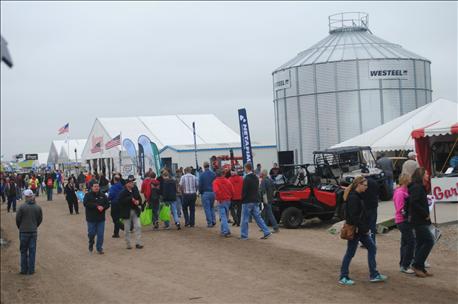
When I was farming full time, most of my machinery was what I considered “experienced,” but what others might consider just plain old. That is how my wife and I made ends meet. We fixed things and kept them running, most of the time. In tough farm financial times, which come along more regularly than we would like, farmers tighten their collective belts and make things work.

BIG CROWDS: Both the Farm Progress Show at Boone, Iowa, and Husker Harvest Days in Grand Island (pictured here) played out to huge crowds of producers. While there was great interest in new innovations, more practical items were on everyone’s watch list.
From recent visits with farm show exhibitors and farmers attending Husker Harvest Days and the Farm Progress Show, I learned that farmers are still buying this year. In spite of poor commodity prices, they are still making purchases. But what they are buying is most likely extremely necessary for their operation, and those products are often without bells and whistles or much bling.
For instance, I talked with folks producing livestock handling equipment. They were finding that their producer-customers were looking less at all the options on processing chutes and more toward new chutes that are very basic, but still get the job done. I’m guessing it could be the same for tractors, tillage implements, planters and combines. Instead of buying the “loaded” package, farmers are looking at used equipment that is in great shape or new equipment that is more basic.
Practicality and need lead the way in driving farmer purchases these days. And maintenance on older machinery becomes even more important. If you need something on the farm, you need it. So, putting off a purchase that is necessary to getting the job done usually puts you behind down the road. However, spreading out those major purchases, repairing and maintaining machinery ahead of time, and planning months in advance for things that are going to cost money to the operation are ways to keep the financial stress level to a minimum.
The other benefit, if we have to find any, to harder times on the farm is that it makes good managers even better. If you have to penny-pinch a little in tough years, it makes you stronger moving forward into those good years on the horizon. Learning how to tighten the belt and still produce helps all of us once in a while.
Farmers are saying that tighter margins on the major commodity crops forces more producers to look hard at alternative enterprises like on-farm custom manufacturing for neighbors, lease hunting and agritourism. Some growers are also changing crop rotations to include cover crops or alternative crops with emerging markets.
The last time corn was extremely low, our family began raising black oil sunflowers and marketing our own brand of wild bird seed from the farm. While this enterprise did not last forever, it did help us get through the times of low corn prices. And it gave motorists along our road something to stop and take photos of when the fields were in bloom.
It seems that farmers always figure out a way to handle tough times and still produce. It has always been that way, and I’m certain it will continue. Farmers are just looking at less bling and to more pencil pushing as ways to muddle through.
About the Author(s)
You May Also Like






